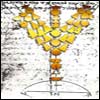Rabbi Chiya began [his discourse about the righteous seemingly lacking trust in G‑d] by quoting: "iniquities prevail upon me, You shall purge away our transgressions". (Psalms 65:4) This verse is difficult, because its first half [in the singular, does not fit together with] the second half [which is in the plural]. But [King] David asked [forgiveness] first for himself [to enable him to pray as a righteous person on behalf of] everyone else [in Israel]. "Iniquities prevail against me" means [those sins of others outweigh mine]. David said: I know I myself have sinned, but how many wicked in the world have sins more grievous than mine! [So I could be considered righteous, at least compared to them, and therefore worthy that my prayers be accepted.] For that reason, I ask first for me and then [also] for them: "our transgressions, You shall purge away."
Come and see [another way of interpreting this verse]! When transpressions increase in the world, they rise up to that place [the chamber of gevura] where the books of the wicked are open [for judgment on them], as it is written: "the judges sit and the books are open". (Daniel 7:10) [These are the books that are kept recording the deeds of each wicked person and when they die, these books are brought before the judges] and that book [that is opened in the palace of gevura/judgment] is above David's head [that is above the sefira of malchut], therefore [David says:] "Iniquities prevail upon me..." [i.e. they rose to the chamber of gevura which is above his attribute of malchut, therefore David is unable to rectify or sweeten them; only] "...You shall purge away our transgressions" [for 'You' is the Holy One Blessed be He who acts through the attribute of chesed, which is above the attribute of gevura to cleanse and purify them with the waters of His kindness].
Jacob likewise [did not trust that G‑d would forgive his sins] and therefore Jacob did not have faith [in G‑d's promise to him, that He would safeguard him]. Do not say that he did not trust in G‑d. It is not so. He simply did not believe in himself [that he was worthy of Heavenly protection] and he was afraid that he might sin and that sin would remove the safeguarding from him and as a result, would prevent him from returning home in peace. Therefore, he did not trust himself. [Here we see how the righteous are constantly fearful that they may sin before G‑d.] "And Havaya will be for me Elokim" means when I will return in peace, I will even put [G‑d's name Havaya, which stands for] mercy before [me, as if it were the name Elokim which stands for] judgment, so I worship Him always. [But on his travels it was necessary for Jacob to meditate on the Name representing the attribute of mercy so that the attribute would be with him to save him from Esau and from Laban.]
Rabbi Aha [disagreed and said that he did not want to arouse the attribute of jugdment on his travels at all.] Jacob said: Now [i.e. on this journey] I do not need [to arouse the attribute of] judgment [rather that of mercy, to protect me from Esau and Laban.] When I return to my father's house [which is related to judgment, Isaac's attribute], I [my attribute of Compassion/tiferet also] will include [his attribute of] judgment and I will connect to it [as my attribute blends the two]. Rabbi Yosi said: This is not so [that on Jacob's travels, he did not wish to arouse the attribute of judgment]. But he said, "If Elokim will be with me," for I need [the attribute of] judgment [signified by Elokim, to be aroused to] safeguard me [justifiably, against Esau's and Laban's wishes to cause me harm] until I return in peace to my father's house. But once I have safely returned, I will include mercy within judgment. And I will be bound in a faithful bond [“faithful” representing the sefira of malchut] to make all [the sefirot] as one.
BeRahamim LeHayyim: Why did the Ari and Chida include this, and what are they trying to teach us by doing so?
Life is all about balance, that proper mix of leniency and strictness. We all can sense when someone achieves it. That person seems content, centered, never angry or annoyed by trivialities. He or she seems to radiate light from the inside.
What is the trick?
Perhaps we must be internal alchemists. When we feel we are being too harsh, we should inject ourselves with a shot of kindness. When we sense that being too expansive is not working, we should add a dose of discipline. The goal is hishtavut/balance. In the words of the Holy Ba'al Shem Tov on the verse, "I have placed [in Hebrew, 'shiviti'] G‑d before me constantly": (Psalms 16:8) don't read Shiviti as "I place," rather read it as Hishtavut/balance...I am always balanced before G‑d.
That was the magic, the revelation of our father Jacob, who blended the attribute of his grandfather Abraham and his father Isaac, honoring their memories and carving a new, centered path for us, his children, the Children of Israel.
What does the above mean to YOU?! Why is this text being revealed to you right NOW?!
Bracketed annotations from Metok Midevash and Sulam commentaries
Copyright 2003 by KabbalaOnline.org, a project of Ascent of Safed (//ascentofsafed.com). All rights reserved, including the right to reproduce this work or portions thereof, in any form, unless with permission, in writing, from Kabbala Online.





Start a Discussion